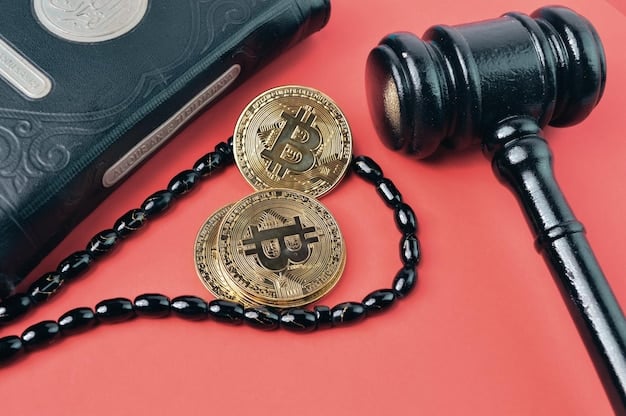Altcoin Regulation in the US: SEC Guidelines & Your Portfolio Impact

Altcoin regulation in the US is undergoing significant changes with new SEC guidelines, and understanding these shifts is crucial for investors to navigate potential impacts on their portfolios over the next three months.
The landscape of altcoin regulation in the US: What New SEC Guidelines Mean for Your Portfolio in the Next 3 Months is rapidly evolving, presenting both challenges and opportunities for investors. Recent signals from the Securities and Exchange Commission (SEC) indicate a more assertive stance on digital assets, necessitating a thorough understanding of the implications for your investment strategies.
Understanding the SEC’s Evolving Stance on Altcoins
The SEC’s approach to altcoins has been anything but static. In recent years, the agency has intensified its scrutiny, leading to increased enforcement actions and greater uncertainty in the market. This section will delve into the key factors influencing the SEC’s regulatory decisions, providing a foundation for understanding the potential impact on your altcoin investments.
Key SEC Actions and Statements
Examining past enforcement actions and public statements from SEC officials provides valuable insights into the agency’s priorities. These actions and statements often signal future regulatory directions.
- Focus on unregistered securities offerings: The SEC has consistently targeted altcoins deemed to be unregistered securities, issuing cease-and-desist orders and levying hefty fines.
- Statements from SEC Chair Gary Gensler: Gensler has repeatedly emphasized the need for greater regulatory oversight of the crypto market, including altcoins, citing investor protection concerns.
- Increased scrutiny of crypto exchanges: The SEC is increasing its attention to exchanges that list altcoins, holding them accountable for ensuring compliance with securities laws.
This heightened regulatory scrutiny is impacting the altcoin market, as investors are becoming increasingly cautious, which highlights the current environment of altcoin regulation in the US.

Analyzing the Impact of New Guidelines on Portfolio Strategy
The new SEC guidelines have a direct impact on investment portfolios containing altcoins. This section analyzes these implications, discussing key investment decisions and strategies for navigating the changing regulatory environment.
Assessing Portfolio Risk
The new regulatory landscape requires investors to reassess the risk profiles of their altcoin holdings. Factors to consider include the liquidity of the altcoin, its compliance with existing regulations, and its potential for being deemed a security by the SEC. Remember, altcoin regulation in the US is evolving at a rapid pace, so be sure to keep up to date with any changes.
Diversification Strategies
Diversifying your digital asset portfolio is crucial in mitigating risks associated with regulatory uncertainties. Strategies may include reallocating investments to more established cryptocurrencies like Bitcoin or Ethereum, which face less regulatory ambiguity.
Regulatory considerations impact the altcoin market in the US. This calls for a reevaluation of investment strategies to mitigate risks associated with regulatory uncertainties.
Navigating Compliance: What Altcoin Projects Need to Do
Compliance is paramount for altcoin projects to thrive in the US regulatory environment. This section details specific measures altcoin projects must take to ensure compliance with SEC regulations and avoid enforcement actions.
Altcoin projects must proactively engage with regulatory frameworks to maintain legality and credibility. SEC’s evolving standards require continuous adaptation to prevent any legal infringements.
SEC Compliance Checklist for Altcoin Projects:
To ensure compliance, altcoin projects should focus on several core areas.
- Legal Evaluation: Altcoin projects need a thorough legal analysis to determine if their tokens are considered securities under US law.
- Disclosure Requirements: Compliance includes providing transparent disclosures to potential investors about the project, its risks, and its regulatory status.
- Registration Obligations: If an altcoin is deemed a security, the project must comply with registration requirements or seek an exemption.
Altcoin projects must seek legal counsel to navigate the intricate regulatory landscape and make sure that they follow the correct guidelines for altcoin regulation in the US. Compliance is crucial for market participation and continued operations.

The Role of Exchanges in Shaping Altcoin Regulation
Cryptocurrency exchanges play a pivotal role in the regulation of altcoins in the US. Their listing decisions and compliance practices significantly impact the accessibility and viability of altcoins in the market.
Exchanges are responsible for monitoring and adhering to legal requirements, which shapes the trading options available to traders. Exchanges’ decisions also define adherence standards in the altcoin ecosystem.
Ensuring Compliance Through Delisting
Exchanges sometimes delist altcoins to comply with regulatory demands, leading to market volatility and potential losses for investors. This is sometimes a necessary step as part of the current altcoin regulation in the US.
Improving Transparency in Altcoin Listings
Another route to compliance involves exchanges increasing transparency by furnishing more comprehensive information regarding the hazards and legal aspects connected with each altcoin. The exchanges can provide details on the project, team qualifications, and any legal uncertainties.
Exchanges significantly shape altcoin regulation through compliance measures and transparency efforts. Adherence to these measures is vital for maintaining market integrity.
How to Stay Informed: Resources and Best Practices
Remaining well-informed about regulatory shifts is essential for altcoin investors navigating the regulatory landscape. This portion outlines crucial resources and practices for staying abreast of new laws and guidelines.
Key Resources for Regulatory Updates
Several channels provide critical updates on regulations which can help you to adhere to the latest requirements for altcoin regulation in the US.
- Official SEC Website: Regularly check the SEC’s website for alerts, releases, and policy modifications.
- Industry Associations: Sign up for notifications from associations dealing in digital assets as they release regulatory reviews.
- Legal Experts: Follow legal professionals who specialize in cryptocurrency. Their analyses often deliver profound insights into legislative adjustments.
Staying knowledgeable on regulatory adjustments is key for altcoin investors. Continuous monitoring allows for prompt modification of investment tactics.
Future Outlook: Potential Scenarios for Altcoin Regulation
Anticipating future regulatory scenarios enables altcoin investors and projects to better prepare for possible shifts in the market. This section explores potential regulatory outcomes that may emerge in the coming months.
Potential regulatory paths require flexible strategic planning, supporting well-adapted and future-focused operations.
Stricter Enforcement
One likely scenario is stricter enforcement of existing securities laws on altcoins. The SEC might increase audits and take more vigorous action against projects that do not comply with regulations.
Legislative Clarity
Alternatively, there could be endeavors to achieve greater legislative clarity, which may establish clear criteria for digital assets and tokens and standardize requirements to offer greater market certainty.
Analyzing potential regulatory outcomes allows altcoin investors to evolve techniques and secure investments appropriately. Thorough analysis helps in aligning tactics with future regulatory dynamics.
| Key Point | Brief Description |
|---|---|
| 🚨 SEC Scrutiny | Increased enforcement on non-compliant altcoins. |
| ⚖️ Compliance | Projects must meet SEC requirements, or face delisting. |
| 🛡️ Risk Management | Assess and diversify, shift towards safer assets, if needed. |
| 🔎 Stay Informed | Follow SEC announcements and industry news for updates. |
What are the main reasons for SEC scrutiny of Altcoins?
The SEC aims to protect investors by ensuring altcoins comply with securities laws, which many currently do not. This includes monitoring for fraud and ensuring transparency in financial disclosures.
New guidelines require altcoin projects to properly register with the SEC, provide detailed financial reports, and adhere to strict disclosure practices. Non-compliance can lead to penalties or delisting.
Investors should diversify their portfolios, allocate investments to compliant digital assets, and stay informed on new regulatory announcements. Seek advice from financial professionals to assess individual risk levels.
▼
Enforcement timelines vary, often beginning immediately upon the announcement of new rules. The SEC typically starts by issuing warnings, followed by more serious actions for sustained non-compliance.
▼
Impact depends on how strictly each altcoin adheres to regulatory norms, its size, and its liquidity. Coins with transparent operations tend to weather adjustments smoothly relative to others.
Conclusion
Navigating the changing landscape of altcoin regulation in the US requires ongoing awareness, adaptability, and a strategic approach to portfolio management. Staying informed and making proactive adjustments will enable investors to safeguard their investments and capitalize on new opportunities as the regulatory framework evolves.





